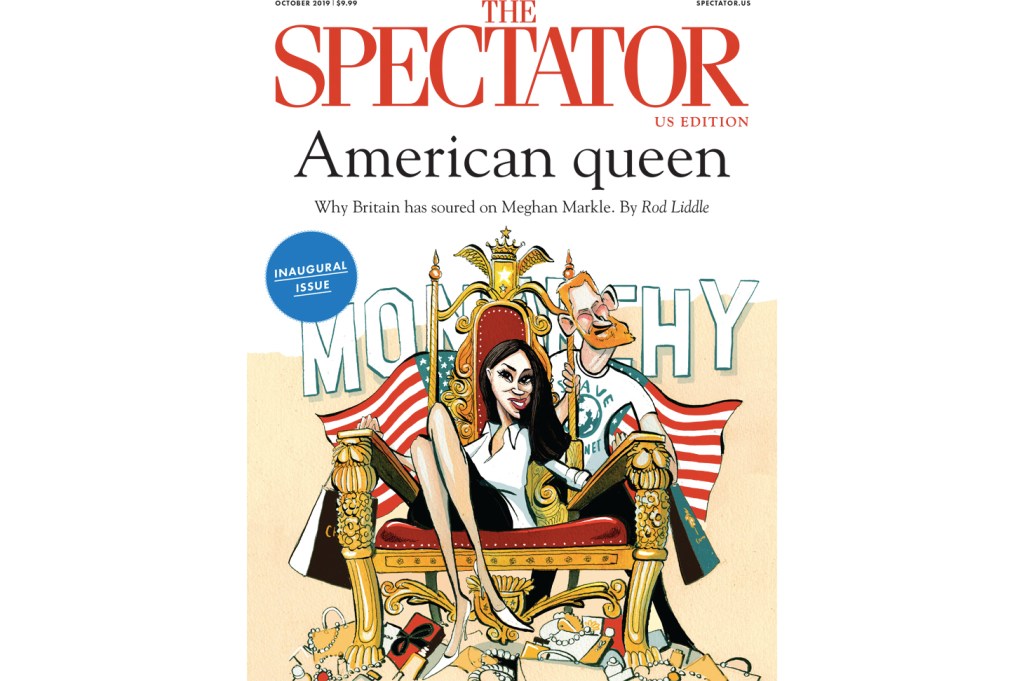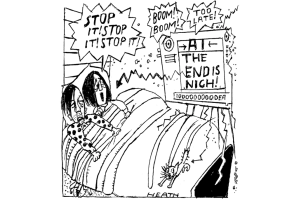‘The Spectator is the best written paper,’ the American Whig Review said in 1851. ‘It has a place for every thing, and every thing can be found in its place.’ Not much has changed. The Spectator is still the greatest magazine in the English language. We will soon become the first magazine in history to publish a 10,000th edition. As that milestone approaches, we are expanding: this first American issue marks the beginning of an exciting New World chapter.
It’s odd, perhaps, that it has taken us 191 years to come to America. The Spectator, rooted in true liberal and radical thinking, has long had an affinity for the Land of the Free. Our history is full of American connections. We lost a large chunk of our English readership by supporting the North over the South in the Civil War, but that didn’t put us off. In the middle of the 19th century, we were part-owned by Americans. One of our later editors, John St Loe Strachey, formed a bond with Teddy Roosevelt, who in 1902 had him to stay at the White House.
During World War One, Strachey repaid the favor by hosting ‘American tea parties’ at his house in London so that British ministers could brief US newspaper correspondents. When Mark Twain wanted to complain publicly about a British publisher ripping off his books, he wrote to The Spectator. And our most famous editor of recent times, the prime minister, Boris Johnson, was born in New York City.
In other words, America is in The Spectator’s DNA, and imported copies of the Speccie have always appeared on the discerning American’s reading list. It feels natural, therefore, to establish a presence here, and we dare to believe that we offer something that is lacking in journalism on both sides of the Atlantic.
The Spectator isn’t a political party; it’s more a cocktail party. We’re fascinated by politics, but we prefer to see life in the round. That’s why we dedicate so many pages to books, arts, food and drink. Most magazines publish product-placement dross dressed up as travel writing. We bring you Place, in which we invite authors to describe their favorite destinations with recourse to the minibar, not the press release.
In these pages, you’ll find not just articles about Republicans and Democrats, right and left, but also fine writing on anger, fatherhood, pornography, space, alcohol, Adderall and more. We’ll bring you the best and most relevant pieces from our British edition, as well as lots of America-only articles from our growing stable of American writers.
This is why we chose Rod Liddle’s excoriation of Meghan Markle, the American royal, for our first cover story — instead of, say, an article about Donald Trump. There will be plenty of opportunities to talk about the president in the coming months, but the story of Meghan, Duchess of Sussex, is the neatest of allegories for our celebrity-struck times. When Prince Harry chose to marry a mixed-race American, most fair-minded Britons and Americans were delighted. What better way to celebrate the friendship of two great allies and make up for the Wallis Simpson business?
But Meghan has, as Mr Liddle relates, turned out to be a transatlantic nightmare. She’s fast becoming the Princess of Woke: another rich and famous hypocrite who jets around the world telling inferiors to burn less gas while lecturing the poor about poverty. The hectoring of these virtue-signaling 21st-century elitists was one of the aggravations that prompted the brave American public to elect Donald Trump in revolt. We celebrate that spirit of rebellion. Mr Liddle is one of the voices that have made our British edition the success it is today. In these pages, you’ll find other brilliant London Spectator columnists and writers: novelist Lionel Shriver (born in Gastonia, North Carolina), our life correspondents Taki (who went to school in New Jersey) and Jeremy Clarke (school of life), Cosmo Landesman (born in St Louis, Missouri) and Toby Young (author of How To Lose Friends & Alienate People), as well as fearlessly independent minds such as Julie Bindel, Philip Hensher and Douglas Murray. You might also recognize some of our American writers: Roger Kimball, Bridget Phetasy, Bill Kauffman, Daniel McCarthy, Andrew Cockburn and Hannah Niemeier.
Our contributors are chosen for originality and sense of style, not political affiliation. It’s not The Spectator’s job to tell people how to think: we want to entertain and challenge readers. Robert Rintoul, who founded the current incarnation of the magazine in 1828, said that its purpose was ‘to convey intelligence’. That holds today, but we don’t take ourselves too seriously. We’re not part of the conservative or any other movement. We will always find life amusing, and never confuse the serious with the dull.
Of course, we recognize that democracies everywhere are in a tumultuous phase. We will cover that. We see that the old center-right trinity of tax cuts, liberal internationalism and culture war gestures no longer passes muster. We understand that, across the world, a new nationalism is taking shape.
We don’t regard that development with particular horror, yet we feel free to criticize the emerging order as much as the old. The Spectator reserves the right to say whatever it damn well pleases. What could be more American than that?
This article was originally published in The Spectator’s October 2019 US edition.


















